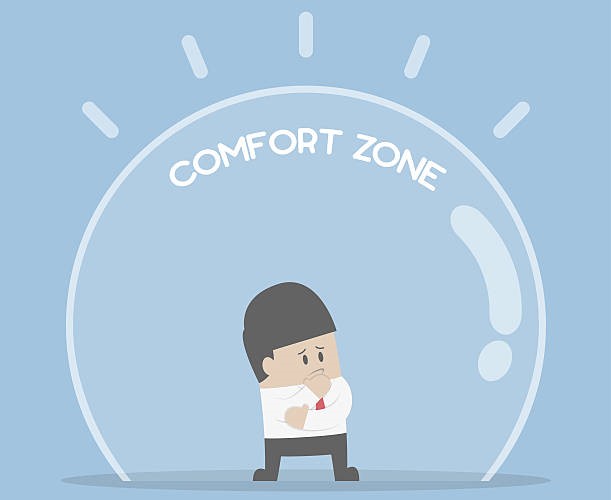3 Ways to Expand Your Comfort Zone
Expanding Your Comfort Zone
Become comfortable being uncomfortable. We always hear about stepping out of our comfort zone and pushing past our personal limits into some void of enlightenment. So is there a truth to all this?
Here are three quick steps for expanding your comfort zone.
Tip number 1: Decide if it’s necessary.
The term comfort zone is a reference to our thoughts, our feelings, and our habits that contribute to our daily experience. This might also include the knowledge, skillset, and talents we have in life.
Let’s start with this concept: Stepping out of one’s comfort zone isn’t always necessary. In general terms, we can build on our character strengths to create challenge and success in each unique venture.
People often spout it as motivation-- “Get out of your comfort zone!” they say, or, “Life starts when your comfort zone ends!”
But that begs the question, “Why?” Knowing why helps. Really think about things: Is it necessary?
Expanding your comfort zone is perhaps a better concept. It’s an extension of your emotional limits, in order to reach one’s full potential.
Expanding your comfort zone should not go against any clinical diagnosis of anxiety, phobias, or related mental conditions. Working through things like post-traumatic stress, depression, and generalized anxiety disorder requires the help from a mental health professional.
If you think any of this applies to you, do not decide to push through your emotional discomfort and instead reach out for help-- for adolescents, help means a trusted adult like a parent/guardian or school counselor, and for adults, help is finding a licensed professional as an expert in the field of mental health.
Resources include IQ Matrix, WebMD, Mayo Clinic, and Psychology Today.
Instead, if working through general discomfort in life is something that is possible and manageable, albeit challenging, then, and only then, should you carry on with these recommendations.
That said, if safe and you stand to gain from it, absolutely yes, get out of your comfort zone.
Specifically, this could mean speaking up more in social settings or communicating your feelings in regards to a relationship. It could mean trying something new with a physical activity or exercise routine. It could be putting your work out there as an artist, writer, musician, or other creative endeavor.
There are lots of possibilities in expanding your comfort zone-- just make sure it’s worthwhile.
Tip number 2: Acknowledge fear exists.
Be willing and brave enough to admit that you get scared. We all get scared. Every single human being has fears.
If you’ve ever heard someone say, “I’m not afraid of anything,” you realize how ridiculous it sounds.
Of course we’re afraid of something. Many things, perhaps. But that’s not to say that we are weak... weak-minded, weak-hearted, or even physically weak.
The strongest people, the mentally strongest people, are able to admit that they have fear; it’s how they face that fear in life that matters-- how they respond after the initial emotional reaction.
Fear is a fundamental human emotion that is a natural response to danger. It is a necessary and usable feeling that allows us, among other things, to survive and evolve. In 21st century terms, it is more and more rare that we need our fight or flight response to engage in a way that has us fending off physical threats. It happens, that’s for sure, depending on the environment-- community, family life, and other stressors can exist that pose a true threat to our safety. That’s not the focus here. The focus is mental and emotional well-being. It is admitting to ourselves that much of our fear comes from other places besides physical safety-- it comes from embarrassment and shame, it comes from worry and anxiety, it comes from a lack of worth and/or a lack of love.
The point is, acknowledging fear is not an easy step; it puts us in a vulnerable state, and that’s not always a pleasant place to be. Just like Tip #1, as you decide if this is all necessary, facing fear is not done just for the sake of it. Acknowledging fear is necessary, but confronting it is different-- this is a big decision and many items will be considered.
In terms of specifics, what’s the fear of public speaking? Potential embarrassment. What about a new sport? Fear of failure. How about a creative project? Maybe mockery. In so many cases, fear comes down to a diminishment in self-worth.
No one ever said extending yourself in this way is easy. In fact, it’s one of the toughest things to do. Like confronting a figure chasing you through a nightmare, it’s the exact opposite of what our brains are telling us to do.
So, if it’s really necessary to expand your comfort zone, if you have acknowledged fears and they aren’t linked to any pre-existing conditions, then it’s finally possible to push through the mental and emotional walls we’ve built up to dip our toes in discomfort… and potentially benefit from the experience.
Tip number 3: Test and retest.
Just like most people like to dip their toe into the water before jumping into a swimming pool or lake or other body of water, testing out a personal expansion like this is only natural. Pushing yourself to extend your current comfort zone does not need to be a giant leap-- no need to cannonball into untested waters.
How you test things out will look differently based on what it is you are trying to do.
There are a few particularly common desires in expanding the comfort zone, most of which tend to increase worry and nervousness.
For example, sometimes people move into a new town and want to increase social connections. This might include speaking up and asking if someone else wants to hang out. It’s a bit awkward to say something like, “Hi, um, do you want to be friends?” So, as we can all imagine, this pushes us out of our comfort zone quite a bit.
Another example is people want to try something physically new such as rock climbing, a different workout, a dance class, For many this is simply scary. So of course it pushes us out of our comfort zone.
Are you thinking of communicating a crush to start a relationship? Are you starting a YouTube channel or diving into a new video game? Do you want to brave the world of music? Vulnerability is a tricky thing and it shouldn’t be taken lightly. When we are “out there” for others to judge us socially, it can be a very uncomfortable feeling.
Test the waters, and ease into expanding that comfort zone. Reflect on how scary and horrible it really was. And then retest your threshold. Or, in some of the cases just mentioned, it might just be that you’ve tested the waters enough. Time to jump in head first and see how it goes.
You might receive some feedback that is less than stellar. It happens.
Think of it this way: The more you expand your comfort zone, the more you find out what you can really do in life. But the more people might offer their opinion either way as a result. Worry less about others, and more about yourself. Easier said than done, of course, but keep in mind that negativity only comes from those who want to build themselves up by pulling others down.
No truly kind and content individual will ever purposefully attack another person who is trying new things.
Others might offer criticism, but that’s different. Constructive feedback does not always equate to glowing feedback. That’s generally what we want anyways. Honest help and helpful honesty.
In the end, when expanding your comfort zone, you might need to test and retest, reflect, and retest some more. Someone bettering themselves by pushing their personal threshold is someone we all recognize as brave and driven.
“Growing Up Great!”
For more health tips geared towards adolescent boys, check out Growing Up Great!, a body-positive guide to getting through puberty confidently by respecting the body and all of its changes.





